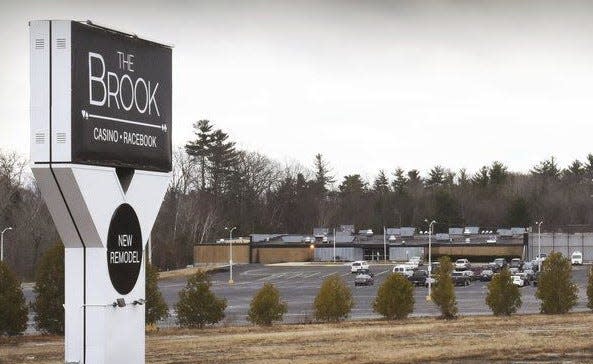332-unit luxury housing complex at former Seabrook greyhound track rejected: Here’s why
SEABROOK — A proposal to construct more than 330 new housing units on the Route 107 property owned by The Brook gambling venue has hit a roadblock.
The town’s Zoning Board voted unanimously Wednesday night to reject variances needed to make the project a reality.
The application for variances was filed by Nevada-based RMH NH, LLC, a company linked to The Brook operator Eureka Casinos. It requested variances to build a multi-building rental housing complex on 75.6 acres of its land at 319 Route 107. Intended for the southwest corner of the lot of the former greyhound racing track, the land spans two town zones: the rural zone and the industrial zone.

The proposal called for three, four-story apartment buildings at the “core” of the complex with 304 rental units — 144 one-bedroom and 160 two-bedroom apartments. Surrounding the three buildings would be 28 two-bedroom townhouses, according to the application, for a total of 332 housing units.
Variances are required to build the complex because, according to Seabrook’s zoning ordinances, multi-unit housing is not permitted in the rural or industrial zones, according to ZBA Chairman Jeff Brown.
Reimagining the Brook: Seabrook casino rolling out new games, grand ballroom and more
Opposition to the project
Brown said he wasn’t surprised to see dozens of Seabrook residents turn out at the hearing expressing their displeasure with the proposal. But what he found unexpected was RMH NH’s presentation Wednesday night, because it differed from the company’s written ZBA application.
At the hearing the company promoted a luxury housing complex at the top of the rental market, Brown said, while the application “focused on workforce housing.”
Although a market-rate housing development was mentioned, in its application RMH NH’s implied it was seriously evaluating building housing to accommodate the average worker to help alleviate the state’s labor shortage.
In its application, RMH NH cautioned board members the town’s powers to regulate a “workforce housing project” are limited. According to the application, New Hampshire law “expressly states that no ordinance or regulation shall be interpreted or enforced to diminish or deny reasonable opportunities for workforce housing.”
During his presentation Wednesday night, RMH NH’s attorney John Cronin stated more than once the project was “not workforce housing” nor “low-income housing.”
No plan for a false alarm: Seabrook nuclear plant mishap exposes gap in NH protocols
Project described as a ‘luxury development’
Andre Carrier, president and chief operating officer of Eureka Casinos, proudly described the project as a “luxury development, because that’s what the market wants.”
Rent prices would range from $2,200 to $3,500 for the one- and two-bedroom units, Carrier said, and amenities would include a pool, gym, walking trails, even pickleball courts. He said the typical renter would be empty nesters who had sold their big homes and were looking to downsize in a seaside community, as well as young professionals renting until they can find something to buy. Neither, he said, bring a lot of children with them to impact schools.

Cronin presented a number of letters endorsing the proposal, including one from the Hampton Area Chamber of Commerce.
Abutters not happy
While RMH NH stated in its application they met with abutters and they didn’t find the project objectionable, that didn't prove to be the case Wednesday night.
One abutter, Rob Johnson, said Carrier misled abutters at the meeting at The Brook. After a nice meal, Johnson said, Carrier’s presentation offered a little about other types of commercial developments on the land, then “spun” the benefits of the housing complex.
“You did a great job of pulling the wool over our eyes,” Johnson said, adding he was against the project.
Cronin told ZBA members the addition of 332 housing units would add about $900,000 in new tax revenues, but only 18 children to Seabrook’s school district, something he said local schools could easily absorb without cost increases. He also denied the housing complex would put additional demands on surrounding roads and other town services, like police, fire, water and sewer.
Those claims didn’t fly with most residents at the hearing, including Philip Walsh, who said all Seabrook taxpayers would pick up the tab for the stress such a large housing complex would put on town services.
“You’re going to hurt the teachers; you’re going to hurt the police department; you’re going to hurt the fire department,” Walsh said. “$900,000 is nothing; it’s chump change. The burden will fall on the property owners.”
Abutter Samuel Rodrigez told the board he moved to Seabrook to get away from just this type of atmosphere.
“I know what it’s like to have the trash and noise from too many people; I came here from Lynn,” said Rodrigez. “This isn’t going to affect Seabrook in a positive manner. I saw this in Revere with (the redevelopment of) Suffolk Downs (former horse racing park).”
More: Seabrook family regroups after fire destroys garage and car, damages home
Brown, the ZBA chairman, told Cronin and Carrier that historically residential developments increase demands on a community’s services while providing a minimum in property taxes. He added industrial or commercial developments do the opposite, they put fewer demand on services while maximizing tax revenue.
He also challenged the implication Cronin made in his application that Seabrook doesn’t currently provide reasonable opportunities for housing.
Brown said along New Hampshire’s Seacoast, Seabrook already offers a large inventory of rental units and apartment complexes, more than other communities in the region. Its housing opportunities include the 400-unit Rockingham Village, which caters to renters of low to moderate income.
Seabrook also has a number of mobile home parks, Brown said, providing additional affordable housing options. And unlike most of its neighbors, Brown added, Seabrook allows homes on small lots, not the two-acre zoning requirements of other Seacoast towns, which drive up housing costs.
More: Hampton Beach pier south of Boar’s Head? $150K approved to take next step
What’s next
The board rejected all three variance requests for the project. One to allow multiple buildings on one lot, one to allow multi-family dwellings on land where it isn’t permitted, and one to allow structures to exceed maximum height allowances, namely more than 30 feet in the rural zone and 50 feet in the industrial zone.
According to Brown, RMH NH can request reconsideration of the ZBA’s denial, but new information must be presented for another hearing. If that still fails to get ZBA approval, Brown said, RMH NH can file an appeal at Superior Court.
This article originally appeared on Portsmouth Herald: 332-unit luxury housing complex rejected at old Seabrook NH race track
